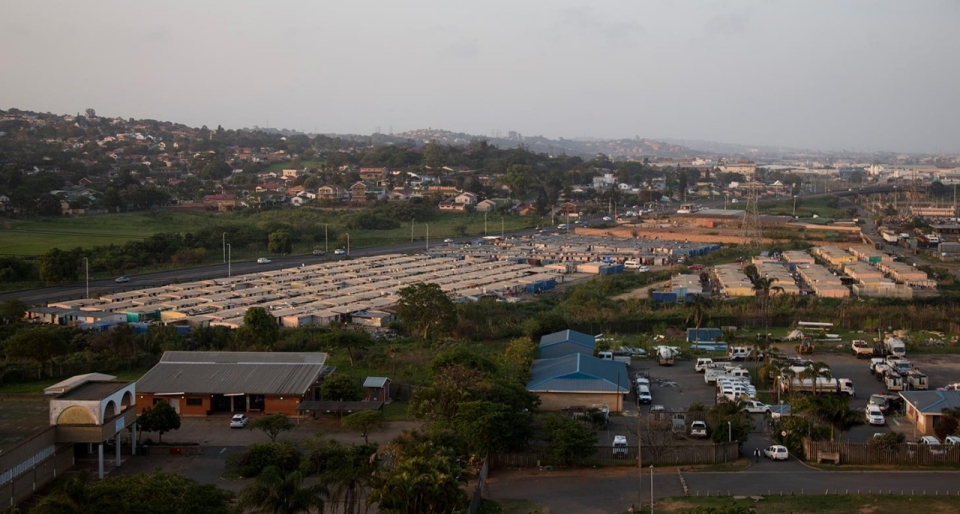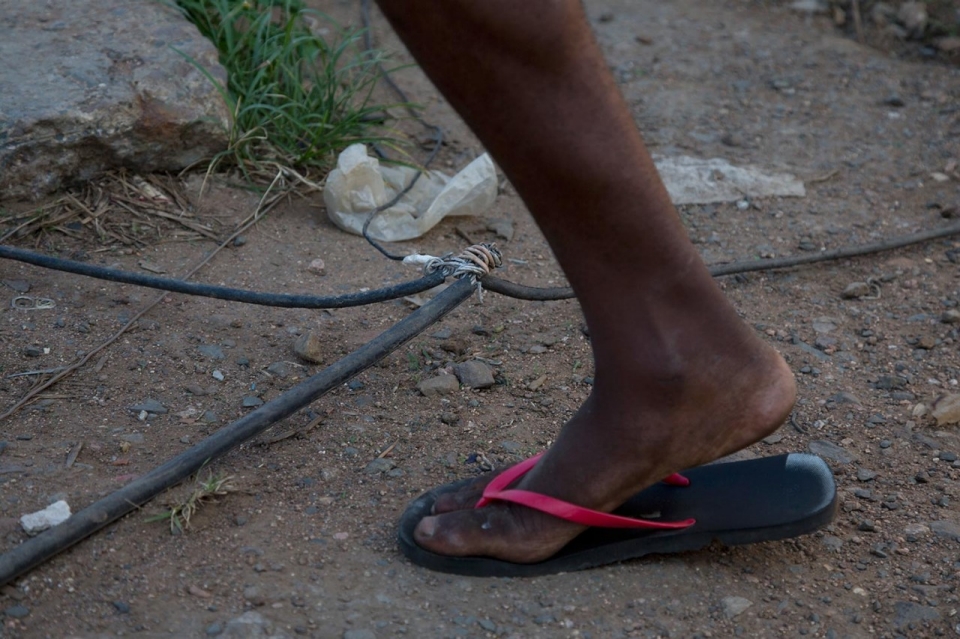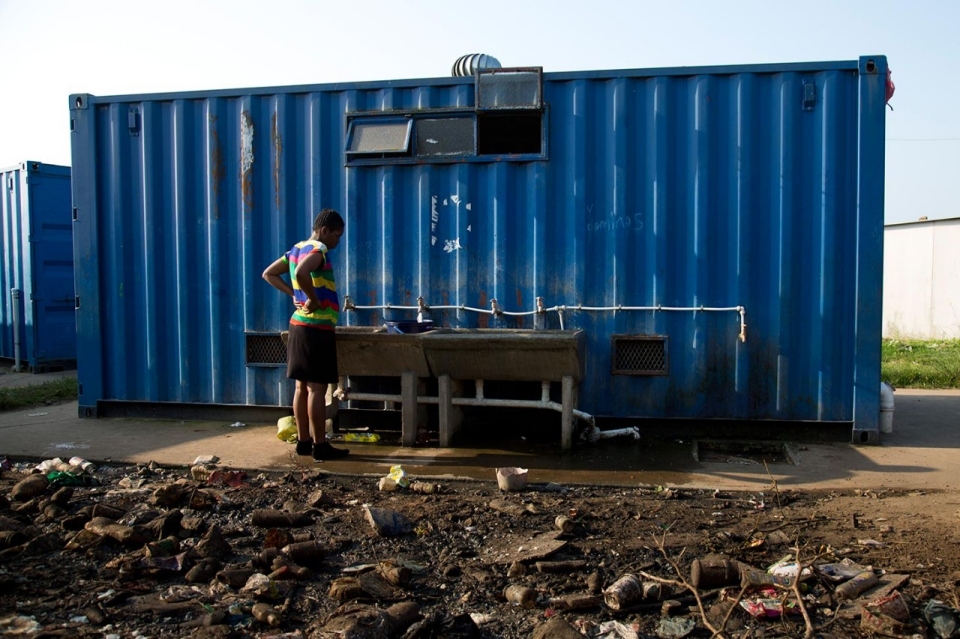30 September 2015
Al Jazeera: In South Africa, fear of more empty promises with Commonwealth Games
by

DURBAN, South Africa — Mbongeni Ndimande shouts in Zulu at some small children playing in a stagnant puddle, a bluish haze streaking through the water. The children look at Ndimande for a moment, laugh at his chiding and then run off.
Ndimande often shouts at children in the Isipingo Transit Camp near the coastal city of Durban. The young man shouts at them when they walk near broken glass. He shouts at them when they play near a large puddle that has pooled over a makeshift electrical cable. He shouts at them to keep them safe.
“You can see, this is not a place where a human being can live,” said Ndimande, gesturing to the rows of small, four-room buildings separated by dirt paths, some flooded with water.
Yet this is where Ndimande, his girlfriend and their infant daughter make their home. Ndimande is the vice-secretary of the committee that runs the camp, an ersatz village of hundreds of families relocated here by the local government to make way for an infrastructure project related to the 2010 Soccer World Cup.

Their stay in the camp was supposed to be for only six months, 18 months at most. Yet six years later, the new homes they were promised have yet to materialize and a population of an estimated 750 families are marooned here, left behind in the aftermath of the Cup.
So there were no cheers in the camp at the announcement earlier this month that South Africa is to host another mega event, the Commonwealth Games of 2022. The games — which used to be known as the British Empire Games — will field 71 teams from 53 countries at an estimated cost of more than $470 million. It will be the first time the competition is held on African soil.
“They are always making empty promises,” Ndimande said. “You know that with the Commonwealth Games coming now other people are going to be suffering like us.”
South Africa’s turn as host to the World Cup is widely viewed as a success, showing the world a modern, economically advanced democracy only 15 years after the end of apartheid. But the competition at a cost of 40 billion rand — about $5.3 billion at the time — also promised to bring economic development and a better life for ordinary South Africans.
But not much of that trickled down to ordinary people, said Trevor Ngwane, a researcher at the University of Johannesburg.
“Of course there was excitement and people like soccer,” he said, “but afterwards, when people did an accounting, afterwards they didn’t gain much.”
In some cases, people not only didn’t benefit, but found themselves in reduced circumstances. Ndimande grew up in Umlazi, a township outside of Durban, in a neighborhood next door to the local soccer stadium. The troubles for Ndimande and others in the community started when the stadium was chosen as a training ground for foreign soccer teams. They were told to vacate their homes, which had been built on land owned by the municipality.
The stadium was ultimately never used for a training facility and foreign teams never came to Umlazi. The place where Ndimande and his neighbors lived is now a shopping mall.
While the families were assured that their stay in the transit camp would be temporary, it has now been six years.

Never meant for permanent settlement, the camp is built on a flood plain next to the Isipingo river, which has overflown at least twice in the past three years, leaving green water marks high up the sides of the temporary buildings. The 750 families here share about a dozen toilets, which are locked by the authorities at night.
“After, you go in the bushes,” said Gloria Ruboni, an elderly resident of the transit camp. “That’s why people are sick.”
When Ruboni lived in Umlazi she wasn’t wealthy, but she wasn’t necessarily poor either. Many residents of her neighborhood took advantage of their location near a main thoroughfare to operate small shops out of their homes and made a decent living. Now, Ruboni and her family live on a $23 grant she receives only because she cares for her grandchild.
“We feel angry, we feel betrayed. For any big project that comes to South Africa, they use poor people,” Ruboni said. “We are valueless people.”

Getting into the camp means driving through a garbage dump with smoldering piles of trash by the roadside. Near the entrance of the camp, children play soccer. They have no net, but in a large group they kick a battered ball back and forth.
Garbage bags are piled high nearby and an elderly woman prods them with a stick, searching for plastic bottles that she will sell for recycling. By one of the toilets, in a puddle next to another trash heap, rats fight one another in broad daylight.
“Not even a demon could live here. But they [the government] are doing nothing to save our lives,” Ndimande said.
Durban officials have promised to no longer use transit camps like that at Isipingo. They also agree that the residents of the transit camp should be moved, but have not been able to find alternative housing.
“Some people do not count in this society. That’s what we have seen,” said S’bu Zikonde, the head of the shackdweller’s movement Abahlali baseMjondolo.
Many of the residents of the Isipingo transit camp were meant to be moved to a new settlement called Cornubia north of Durban. But only a handful were moved before the rest of the houses were illegally occupied by others. According to Durban authorities, the next phase of Cornubia will first be built for athletes competing in the Commonwealth Games, meaning that Durban’s homeless and transient will have to wait awhile longer.
“That frustrates,” Zikonde said. “How long will it be for the homeless to be waiting?”

South Africa’s World Cup was the first on the African continent, and engendered a great deal of national pride for a nation that often finds itself divided by race, class and culture. The South African government has similar, high expectations for the planned 2022 Commonwealth Games.
“With these games we plan to create a better quality of life that is as free as possible of social ills and other challenges faced by young people. We will tell through these games tell our story of an unparalleled unity in diversity, reconstruction and development, our rise and affirmation,” said Fikile Mbalula, South Africa’s minister of sport, in a statement after Durban was awarded the games.
But this sentiment is dismissed by University of KwaZulu Natal Professor Patrick Bond: “We’re all in this great party and we’re all in this together and we’re going ‘South Africa!’ but then there’s a hangover.”
According to the accounting group Grant Thornton, while the World Cup cost about $5.3 billion, its economic impact was only $2.4 billion. In addition, there were also supposed to be other benefits, including improvements to infrastructure and the promise of increased tourism in the future.
“There was hope for huge foreign investment that simply didn’t materialize and the brand benefits for South Africa are mixed,” Bond said.
There were also supposed to be jobs created by World Cup construction projects, but they only offered temporary employment around mega projects, he added.

Sivuyile Chulayo, the director of a mid-sized construction company, knows a little about this. When the World Cup was announced, he and others expanded their operations expecting more work — but the business didn’t come.
“It never met our expectations,” Chulayo said.
Chulayo said the larger jobs went to foreign companies. Locals like him were only hired to be sub-contractors, he said, where they were paid “peanuts.”
The construction boost also didn’t last and companies like his had to cut their operations and sell their equipment — or worse, go bankrupt.
“A lot of guys ended up getting their equipment repossessed, they got blacklisted,” Chulayo said. “Guys like us, we didn’t get anything. We got screwed over big time.”
In his statement, Mbalula said that the government estimates $1.5 billion in additional economic output for South Africa because of the games, but Chulayo doesn’t expect to benefit from the Commonwealth events any more than he did during the World Cup.
“I believe it’s going to be the same thing again.”

But this time may be different, Zikonde and Bond said. Lessons were learned during the 2010 World Cup. In addition, the past five years have seen the rise of more radical and left-wing political organizations as well as general protest. Also, a recent outbreak of xenophobic violence earlier this year killed at least seven people and left thousands of foreigners homeless — and it started in Durban.
“We have a new class politics, a consciousness. Bread and circuses, a few crumbs like social grants and a World Cup, a Commonwealth Games, those aren’t going to fly, we need something deeper,” Bond said.
In the last six years, the residents of the Isipingo transit camp have periodically protested their circumstances, closing the highway that runs next to them and clashing with riot police.
The sound of a compressor pumping sewage out of a mobile toilet can be heard outside the crammed shelter where Senzo Mbatha sits at a dimly lit table.
Mbatha, another leader in the Isispingo camp, believes that protest is the way to get the attention of those in government.
“We must call them using protest, it’s the only language they understand. It’s the only way they understand,” Mbatha said.
